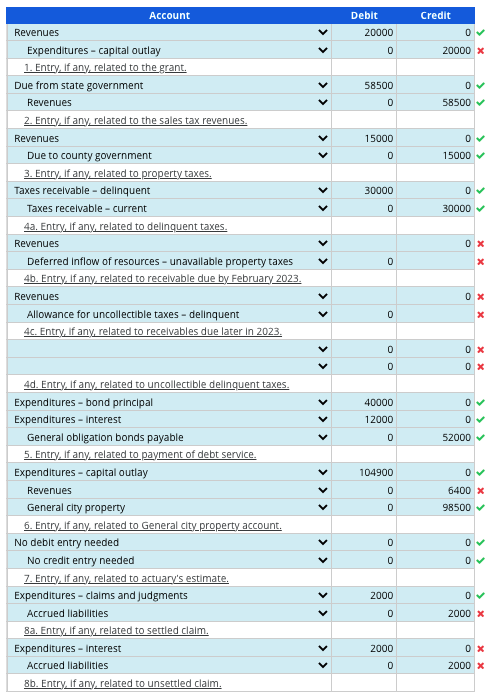Question
Review problem affecting reporting on General Fund As the recently appointed chief accountant of the City of York, you asked the bookkeeper for a trial
Review problem affecting reporting on General Fund
As the recently appointed chief accountant of the City of York, you asked the bookkeeper for a trial balance of the General Fund as of December 31, 2022. York uses only a General Fund to record all its transactions. This is what you received:
| City of York General Fund Trial Balance December 31, 2022 | ||
|---|---|---|
| Debits | Credits | |
| Cash | $20,800 | |
| Short-term investments | 180,000 | |
| Accounts receivable | 11,500 | |
| Taxes receivablecurrent | 30,000 | |
| Tax anticipation notes payable | $58,000 | |
| Appropriations | 927,000 | |
| Expenditures | 795,200 | |
| Estimated revenues | 927,000 | |
| Revenues | 750,000 | |
| General city property | 98,500 | |
| General obligation bonds payable | 52,000 | |
| Unassigned fund balance | 380,000 | |
| $2,115,000 | $2,115,000 |
After reviewing the trial balance, you realize that the inexperienced bookkeeper made errors on some transactions and merely guessed at the correct accounting treatment of other transactions. This is what you found when you reviewed the journal entries and analyzed other transactions and events that had occurred during the year: 1. On December 1, 2022, the city received notice from the state that it would receive a grant to help train its police officers. The grant terms stipulated that, to be eligible for the grant, the city would need to incur certain allowable costs. The city received a check for $20,000 on December 10 as an advance on the grant. The bookkeeper recorded the advance in the Revenues account. As of December 31, however, the city had not yet started the training program. 2. On December 31, 2022, the state department of tax and finance advised the city that the state had collected $58,500 of sales tax revenues on behalf of the city and that a check would be sent to the city by January 20, 2023. No journal entry was made for this information. 3. York collects property taxes on behalf of the county in which it is located. The entire amount received in November 2022 ( $15,000) was recorded as Yorks revenues and was not sent to the county. 4. Analysis of the Taxes receivablecurrent account shows the following: a) The entire $30,000 of receivables is delinquent. b) Based on the history of delinquent tax collections, you estimate that $15,000 of the receivables will be collected by the end of February 2023, that $12,000 of the receivable amount will not be received until much later in 2023, and that $3,000 will ultimately need to be written off as uncollectible. 5. Analysis of the account General obligation bonds payable shows that the debit balance of $52,000 arose from a journal entry made on December 30, 2022, to record payment of debt service ( $40,000 bond principal and $12,000 interest). 6. Analysis of the account General city property shows that the $98,500 debit balance resulted from two journal entries: a) Sale of used truck for $6,400. b) Purchase of new firefighting equipment for $104,900. 7. Although the citys actuary estimated that the city would need to contribute $45,000 to its pension fund for the year, the York City Council decided not to make an appropriation for it because the city needed to conserve its cash. The bookkeeper decided that there was no need to make an accrual. 8. Two lawsuits were brought against the city as a result of damages caused by its trucks during trash collection. One case was settled in late December, for which York will pay $2,000 damages in January 2023. The city attorney believes the city will probably lose the other case as well and may need to pay out $6,000 to settle it. However, the case is complex and is not likely to be resolved for another 15 months. The bookeeper didnt think any entry was needed because no cash was paid. a) Prepare journal entries, as necessary, to correct the City of Yorks records. Record all adjustments related to income recognition to the Revenues account. If no adjustment is necessary, select 'No debit (or credit) entry needed' in the account fields and enter 0 in the amount fields. Assume all adjusting entries are made in the General Fund. If an entry affects more than one debit or credit account, enter the accounts in order of magnitude (largest to smallest balances), debits first.

Step by Step Solution
There are 3 Steps involved in it
Step: 1

Get Instant Access to Expert-Tailored Solutions
See step-by-step solutions with expert insights and AI powered tools for academic success
Step: 2

Step: 3

Ace Your Homework with AI
Get the answers you need in no time with our AI-driven, step-by-step assistance
Get Started


